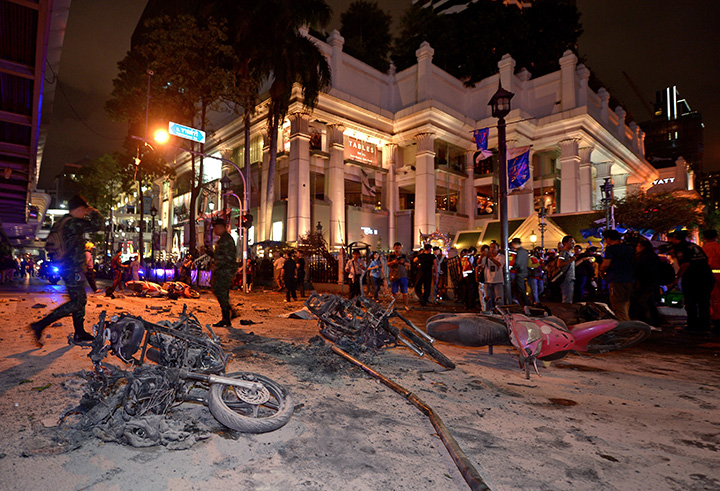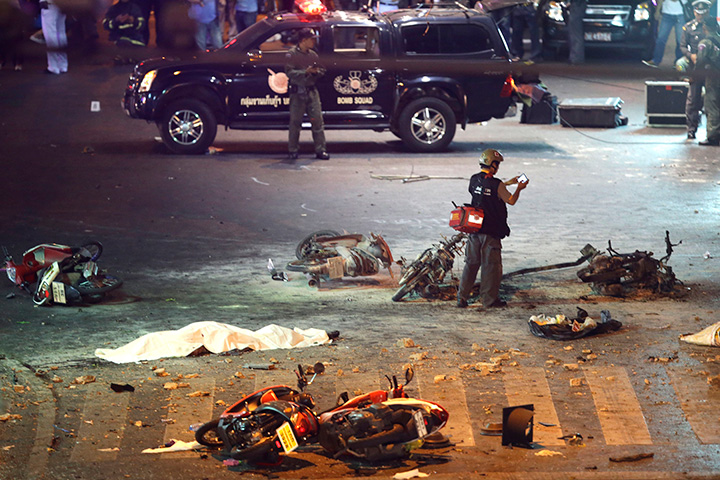WATCH ABOVE: Police in Thailand said it’s too early to say what happened in Bangkok on Monday after a bomb exploded in a popular tourist area and killed 18 people. The investigation is ongoing.

BANGKOK – Police on Tuesday combed through shattered glass and other debris from a Bangkok bomb blast that killed at least 18 people and injured more than 100 the night before, trying to determine who set off the most devastating single attack in the capital’s recent history.
The explosion at a central Bangkok popular shrine in next to one of the city’s busiest intersections went off around 7 p.m., as the upscale area was filled with tourists, office workers and shoppers.
“We cannot say anything right now because there’s no conclusion yet” and investigators were continuing to gather evidence, said national chief of police Somyot Poompanmoung, who was among those surveying the damage Tuesday morning.
With a powerful flash caught on security video and a boom heard blocks away, the blast from the improvised explosive device scattered body parts across Rachaprasong intersection, spattered blood, blasted windows and burned motorbikes to the metal.
“Suddenly there was a big boom, and the whole room just shook, like someone dropped a wrecking ball on top of our ceiling,” said Pim Niyomwan, an English instructor working on the eighth floor of the building right next to the shrine. “The whole building just shook. My four students were hysterical.”
Video shortly after the blast depicts a scene of shock and desperation: people running for their lives and crying amid the debris. An emergency worker in an ambulance, frantically pounding the chest of a victim.
WATCH: Surveillance footage captured the blast as it happened while more video shows the extent of the damage.
No one immediately claimed responsibility for the bombing.
“Those who have planted this bomb are cruel,” Somyot said. “They aim to kill because everyone knows that at 7 p.m. the shrine is crowded with Thais and foreigners. Planting a bomb there means they want to see a lot of dead people.”

Get daily National news
At least 18 people were confirmed dead and 117 injured, according to the Narinthorn emergency medical rescue centre. The dead included Chinese and a Filipino, Somyot said.
Police and soldiers guarded the area Tuesday morning as onlookers stood behind police tape to take pictures. Barricades were set up outside five-star hotels in the neighbourhood and security stopped cars to inspect trunks before letting them pass.
WATCH: A bomb that exploded on Monday at one of Bangkok’s most popular tourist spots has killed 18 people and injured hundreds of others. Emily Elias reports.
More than 12 hours after the blast, onlookers dashed for safety as shards of glass torpedoed to the ground from windows of a nearby building. Nobody appeared to have been injured.
As a single, devastating blow to this Southeast Asian metropolis, Monday’s bombing has no equal in recent history, though Thailand is no stranger to violent attacks. A more-than-decade-long insurgency by southern Muslim separatists has left more than 5,000 dead far from the capital. In Bangkok, politically charged riots centred on this very intersection in 2010 killed more than 90 over two months.
Police said the bomb was made with a pipe wrapped in cloth. Police said it was too soon to determine the motive.
“We still don’t know for sure who did this and why,” Deputy Prime Minister Prawit Wongsuwon told reporters. “We are not sure if it is politically motivated, but they aim to harm our economy and we will hunt them down.”
The bomb detonated at Erawan Shrine, which is dedicated to the Hindu god Brahma, but is extremely popular among Thailand’s Buddhists as well as Chinese tourists. Although Thailand is predominantly Buddhist, it has enormous Hindu influence on its religious practices and language.
Throngs of tourists come there to pray at all hours, lighting incense and offering flowers purchased from rows of stalls set up on the sidewalk along the shrine. The site is a hubbub of activity, with quiet worshippers sometimes flanked by Thai dancers hired by those seeking good fortune, while groups of tourists shuffle in and out.
Bangkok has been relatively peaceful since a military coup ousted a civilian government in May last year after several months of sometimes violent political protests against the previous government. Anusit Kunakorn, secretary of the National Security Council, said Prime Minister Prayuth Chan-ocha, the former army chief who orchestrated the May 2014 coup, was closely monitoring the situation.
At the same time, the military government has tightly controlled dissent, arresting hundreds of its opponents and banning protests. Tensions have risen in recent months, with the junta making clear that it may not hold elections until 2017 and wants a constitution that will allow some type of emergency rule to take the place of an elected government.
Stirring the pot has been exiled former Prime Minister Thaksin Shinawatra, who was ousted in a 2006 coup. It was his sister Yingluck Shinawatra who was ousted as prime minister last year.
Last week, Thaksin posted a message on YouTube urging his followers to reject the draft constitution because he said it was undemocratic. The draft charter is supposed to be voted on next month by a special National Reform Council. If it passes, it is supposed to go to a public referendum around January.
Another source of recent tension is the annual military promotion list, with the junta’s top two leaders – Prime Minister Prayuth and Deputy Prime Minister Prawit – widely believed to be supporting different candidates. The reshuffle, which comes into effect in September, has traditionally been a source of unrest, as different cliques in the army, usually defined by their graduating class in the military academy, seek the most important posts to consolidate their power.
The U.S. Embassy in Bangkok issued an emergency message for U.S. citizens, advising them to avoid the shrine’s area. In Washington, State Department spokesman John Kirby expressed deep sympathy to those affected by the Bangkok explosion. He said authorities were still determining whether any Americans were among the victims.
Tourists reacted with concern.
“We didn’t think anything like this could happen in Bangkok,” said Holger Siegle, a German who said he and his newlywed wife had chosen Thailand because it seemed safe. “Our honeymoon and our vacation will go on, but with a very unsafe feeling.”
While bombings of this magnitude are rare in Bangkok, they are more common where Thailand’s Muslim separatist insurgency has been flaring: in the country’s three Muslim-majority provinces in the deep south.




















Comments